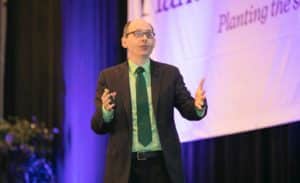Our Uber driver drove us up to a huge, high rise hotel, overlooking the sparkling San Diego Bay. Out of the Uber stepped me and my two co-passengers, Cindy & Carol, two medical doctors from the Sacramento area. We happened to share the same flight and happily agreed to share the Uber since we were all heading to the 6th annual International Plant-Based Nutrition Healthcare Conference.
We had met in 2017 at the 5th annual conference in Orange County, California. Once again this year, Cindy, Carol, and myself were joining one thousand other medical professionals, from all over the world, for four days of educational presentations, networking, and delicious whole food, plant-based meals. Over six years, the Plantrician Project has been organizing and hosting this conference, participation has grown from a few hundred to more than one thousand medical professionals who register early for a spectacular, sold-out event.
You may be wondering, what’s the big deal? Why do so many highly educated medical professionals take four days out of their busy schedule to present at, or attend, a conference that focuses completely on whole food, plant-based nutrition? Finally, why do these servant leaders leave the conference with big smiles, increased energy, and renewed hope that they can make a life-changing difference in their patient’s lives?
P.L.A.N.T.S.
Scott Stoll, MD, and co-founder of the IPBNHC, along with co-founders, Susan Benigas, and Tom Dunnam, MBA, opened the conference with a keynote talk called “Healthcare Organizational Transformation: What’s Working and Why.” It’s all about the PLANTS. PLANTS, or Power Lifestyle And Nutrition Tools Simplified, is an acronym I created to help friends realize the awesome potential of whole food, plant-based nutrition in self-care and healthcare. What does PLANTS stand for?
P is for Power.
What comes to mind when you hear the word “power”? We’ve all heard the phrase, “knowledge is power.” For a lot of medical professionals, power is the knowledge they receive from the extensive education leading into their career. Each busy day of work, they apply that knowledge to the patients or clients they see in hospitals, clinics, or outpatient settings. These professionals are smart, hardworking, and keep up with current medical innovations. Why then, is the American health care system and increasingly, the global healthcare system, in an unsustainable health care crisis? Where is the disconnect?
L is for Lifestyle.
Lifestyle has the power to lead us along a path of health or a path of disease. When it comes to disease, our nation’s health is a long list of sobering statistics. Kim Williams, MD, the former president of American College of Cardiology, reminds us that the top three leading causes of death in the United States are heart disease, cancer, and chronic lower respiratory disease. Ironically, heart disease is also the leading cause of death among cardiologists in the United States.
Heart disease is primarily a chronic disease completely preventable by a healthy lifestyle. The great news for anyone hearing this for the first time is that healthy lifestyle change, adopted across the lifespan, has the power to reverse chronic disease. Aging does not cause chronic disease. In fact, contrary to popular belief, aging can be a graceful, powerful and amazing process. Joel Kahn, MD, addressed the root cause of lifestyle-related disease during his talk on Saturday night called “Lifestyle Choices and Inflammation: The Origins of Chronic Disease.” When we eat whole food, plant-based nutrition, systemic inflammation naturally calms down or disappears.
A is for And, which brings us to N.
N is for Nutrition.
The best of the best in nutrient-dense fuel (meaning the most nutrients available in a package with the least number of calories) is found in whole food, plant-based nutrition. God has created these miraculous sources of life-sustaining fuel, giving us over two-thousand edible plants to choose from. If someone asks what to eat on a plant-based diet, it may take a while to answer because there are so many options.
By choosing to eat our favorite non-refined fruits, vegetables, seeds, nuts, legumes (peas and beans), and grains, we flood our digestive tract with the nutrients capable of keeping each cell running at optimal levels. This, in turn, supports each tissue & organ system.
Anthony Lim, MD, JD, spoke about this during his talk, “Caloric Density: A Simple Yet Powerful Concept.” And then on Saturday evening, we had the pleasure of watching a screening of a brand new documentary, not yet available to the public, called The Game Changers. The Game Changers contains interviews of several well-respected medical professionals and looks closely into the lives of multiple professional athletes who are thriving on plant-based nutrition. The documentary records the athletes as they experience eye-opening changes when they choose to fuel their careers with foods that give them robust returns on their healthy investments.
On Sunday evening, I attended a panel discussion called “How Plant-Based Nutrition Optimizes the Physiology of World Class Athletes.” The panel included four medical professionals, including Scott Still, Dotsie Bausch, James Loomis Jr, and James Wilks. We can all be athletes. Eating like a world-class vegan athlete has a variety of health benefits.
T is for Tools.
Dr. Kim Williams and Dr. Laurie Marbas, editor-in-chief and managing editor respectively, introduced a very exciting tool that recently went live online, The International Journal of Disease Prevention. This particular journal is unique in that it offers evidence-based scientific research, as well as digest style articles and videos about the power of whole food, plant-based nutrition in the role of disease prevention.
On Saturday evening before the screening of The Game Changers, Ken Rubin of Rouxbe gave an entertaining cooking demonstration called “Culinary Wellness, Foundational Cooking Techniques for Taking Control of Health.” How many of us realize that taking control of our health begins in our kitchen? Making a few simple changes in how we shop, prep, cook, and eat, has far-reaching effects for our quality of life.
S is for Simplified.
T. Colin Campbell, Ph.D., author of The China Study, held the floor for two hours on Sunday morning to speak about “Nutritional Research, Reductionism, and Plant-Based Nutrition, A Recipe for Confusion.” We are bombarded with nutrition information from many sources. Evidence-based research with large-scale, randomized and controlled trials offers objective data to support the numerous observational data sets. This gold standard research may be tricky to find and time-consuming to read.
Michael Greger, MD, of NutritionFacts.org, is someone who has dedicated his life to simplifying quality research. Dr. Greger spoke on Monday morning about “How Not to Die: Scientific Strategies for Maximum Disease Prevention.” A small seed of doubt has the power to grow into a garden of weeds, choking out the truth and simplicity of what optimal nutrition really looks like. Each of these esteemed presenters has a common theme of watering the truth filled seeds of lifestyle medicine, practiced through eating a primarily whole food, plant-based diet.
Our Role
Life & Health was a proud sponsor of the 2018 International Plant-Based Nutrition Healthcare Conference. We had a booth in the hallway outside the large conference room and offered information and sales of Diabetes Undone for Individuals and Groups, as well as two different whole food, plant-based cookbooks, From Plant to Plate, and From Plant to Plate: Diabetes Edition. Dr. Wes Youngberg, the host of the video-based, Diabetes Undone program, also presented at the conference on Sunday afternoon.
Dr. Youngberg’s talk titled “Insulin Resistance: Understanding the Role of Diet in Treating and Reversing Type 2 Diabetes” clearly engaged and motivated the audience of medical professionals. Pre-diabetes and type 2 diabetes affect nearly 50% of the world’s population. This is a pandemic with a huge financial burden to healthcare systems. Quality of life quickly deteriorates, often resulting in expensive and invasive dialysis, amputations, heart disease complications, and death.
Pre-diabetes and type 2 diabetes are completely preventable and often completely reversible by applying a whole food, plant-based diet. The information Dr. Youngberg and all of the other professionals presented at IPBNHC was life-changing. The meals provided were an outstanding example of how a life-changing diet can be simple and delicious.
Uber pulled away from the hotel and drove me to the airport on Monday evening. Carol and Cindy had already left on an earlier flight. It had been a fantastic four days in San Diego. The International Plant-Based Nutrition Healthcare Conference once again delivered a powerful and successful conference.
—
Photo credit: The Plantrician Project






2 servings
1 slice
* The % Daily Value (DV) tells you how much a nutrient in a serving of food contributes to a daily diet. 2,000 calories a day is used for general nutrition advice.